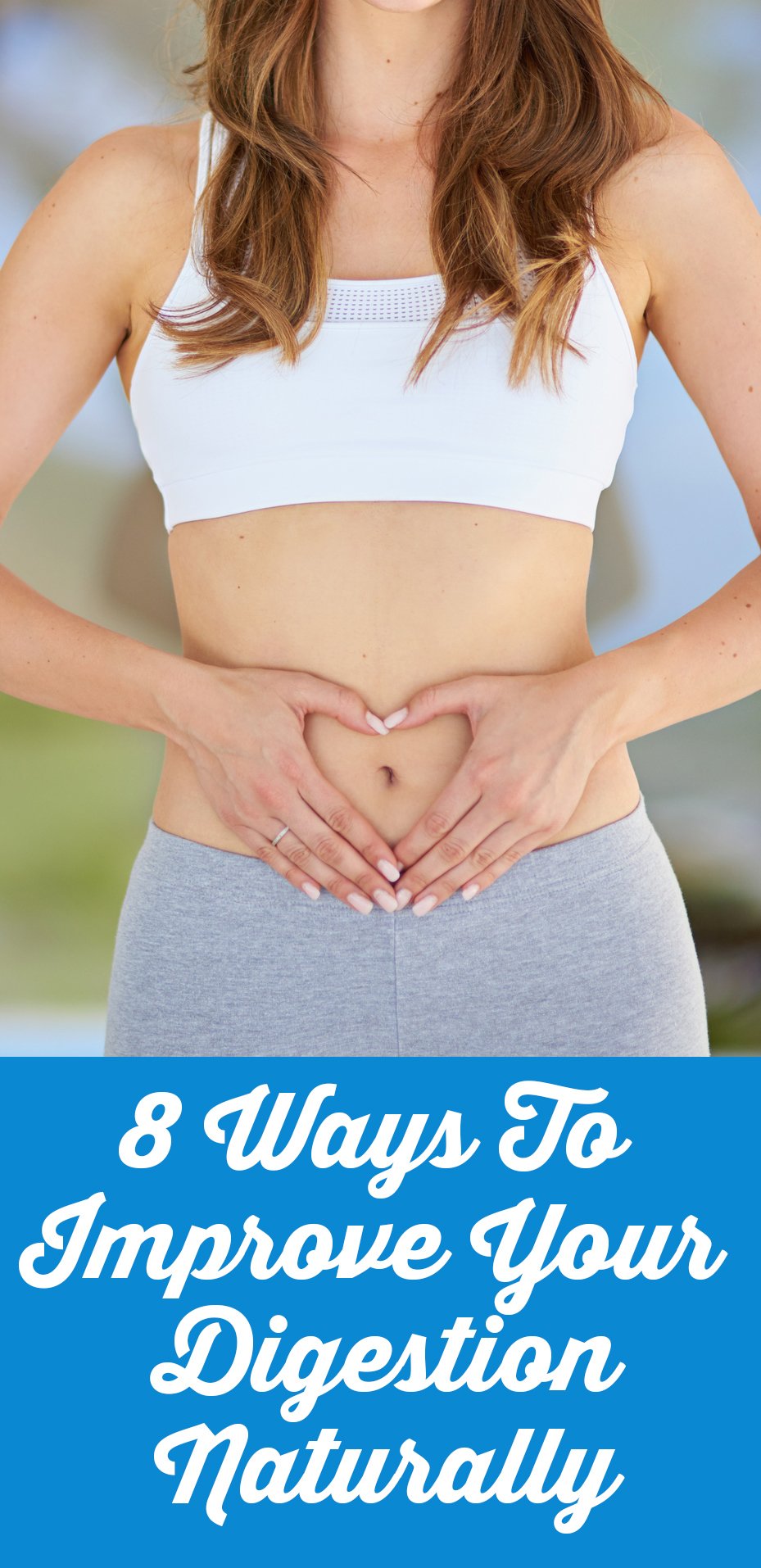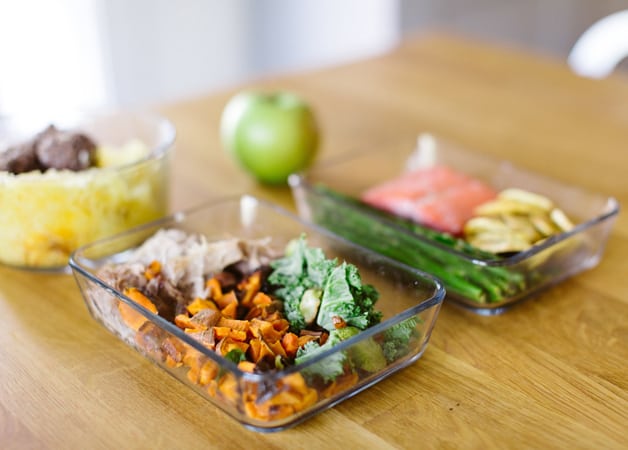8 Ways To Improve Your Digestion Naturally
I’m probably not going to shock you when I say that digestive problems are so widespread and often the root cause of so many issues that come to me in my nutritional therapy practice. Fatigue, autoimmunity, migraines, vitamin and mineral deficiency, leaky gut, it can all connect back to poor digestion. Sadly, digestive problems are more or less normalized in our society. We’re inundated by commercials for acid blockers and anti-bloating medication and just assume that it’s entirely normal to have an upset stomach after meals. Digestive issues may be common, but they are not normal. Not only are issues like bloating, gas, hunger irregularities, and constipation uncomfortable, they can eventually lead to worse issues down the line. Society gives us a lot of pills for digestive issues, but not a lot of holistic strategies for natural management. So, that’s why I’m sharing my Top 6 Tips To Improve Your Digestion Naturally!
Being in the autoimmune and gut healing space and having written a 30 Day Gut Healing Guide e-book, the topic of digestion is incredibly close to my heart. Though I didn’t want to admit it, I suffered from digestive problems from as early on as I can remember. I had food aversions, hunger irregularities, and a constant nausea that I just couldn’t place. I went like this for years until it finally snowballed into autoimmunity and leaky gut. Despite my best efforts, nothing really evened out until tackling my digestive health!
First, Why Does Your Digestion Matter So Much?
So much emphasis is put on diet in this holistic health world. We see food as the thing that heals us, and if we’re eating a diet that isn’t working, we just jump to another diet. Here’s the thing nobody tells you… diet isn’t everything.
In the words of the founder of the Nutritional Therapy Association, Gray Grahm, “We are what we digest”. We could be eating the most nutrient dense diet filled with healthy fats, proteins, and vegetables, but if we’re not digesting them, we can’t receive the benefits. I have a handful of clients who come to me eating a perfectly fine diet, but they still feel bad. After we work on their digestion, so many of their issues fall away.
Food and diet are only secondary in importance to digestion just by the order of things! Our digestion is incredibly important, and when we can tackle it naturally, we can change our health drastically.
8 Ways To Improve Your Digestion Naturally

1.Understand how digestion actually works including the symptoms of poor digestion and what they may indicate.
Educating yourself is always key to understanding what is actually going wrong. I never really understood what was going on with my digestion until I became an NTP, and my digestive woes never budged as a result. I didn’t even know how I supposed to feel or how it was supposed to work, so how was I supposed to know how to fix it?
It doesn’t have to be complicated… I love this article on how digestion works.
As previously mentioned, poor digestion may be common but it isn’t normal. Knowing the symptoms of poor digestion can be a good indicator to start to figure out what’s actually going wrong. It’s important to note that symptoms can likely indicate a lot of things, so you can’t judge Here are a few common symptoms and their related
Possible poor fat digestion signs:
- Nausea after meals
- Pain between the right shoulder blade
- Greasy stool
Possible poor protein digestion signs:
- Mineral deficiency
- Poor nail health
Possible poor carbohydrate digestion signs:
- Bloating
- Gas
- Excessive hunger
Possible low stomach acid:
- Reflux
- Not being hungry in the morning
Again, symptoms can indicate a lot of things, and if you have an issue, you should always see a doctor to address it. But knowing what some of your symptoms mean can be helpful in pointing you in the right direction.
2. Eat in a relaxed, grateful state.
I’m admittedly one to answer emails, even watch episodes on The Office on netflix when I’m eating, and have eaten on the go often in the past. Though this seems like a time saving strategy, it’s killer on your digestive health.
In order to properly digest, we need to be in a relaxed, parasympathetic state. If we’re distracted, or stressed our body isn’t focusing on properly gastric juice and enzyme production.
Because digestion always takes a back seat in times of stress, taking extra focus to be grateful for your food is always an amazing digestive health strategy. Not only does gratitude get you out of a stressed state, it shifts your mindset to be thankful for your food.
Here are some practical tips for implementing this step…
- Cut out distractions! No phones, TV, or emails.
- Don’t eat on the go.
- Take a few deep breaths before a meal to calm down
- Say a prayer or blessing of gratitude for the meal
3. Chew your food 30-40 times perete.
That sounds insane, I know, but it’s so effective and necessary. Your stomach doesn’t have teeth, and there’s a reason that we have teeth! Our stomach acid and digestive enzymes can only do so much to break down our food. We need to do the work to really break down our food as much as possible in our mouth in order to properly digest it!
When I first learned this tip when I was studying to be an NTP, I literally counted my bites. I started at 5-10 or less and worked my way up to comfortably chewing my bites 30 times. It was hard, but it makes such a huge difference!
4. Stay hydrated, but stop chugging water around meals.
One of the most common diet culture tips for eating less is drinking tons of water right before a meal. It’s supposed to fill your stomach to the point where you need less food. If only you could see how much I’m rolling my eyes as I type this. Though water consumption is clearly an important part of health in general and a very important piece in digestion, you don’t want to be chugging tons of water around meals. Water and soda’s dilute your stomach acid and interfere with all of the fluids of digestion, making it harder to break down your food.
Rather than chugging whole glasses of water with meals, stick to smaller sips with meals and drink the bulk of your water in between meals.
5. Focus on three balanced meals rather than tons of snacks.
Yet another diet culture tip is to eat lots of little small meals throughout the day to “keep your metabolism running”. Another eyeroll as what this actually does is it never gives your body a chance to fully digest. We need to give our body time to rest and digest our meals rather than constantly eating every hour.
That’s not to say that snacks are the end of the world. If you’re legitimately hungry, you should be eating. However, focus on getting the bulk of your food at meals rather than snacking all day.
6. Balance your meals to feature healthy fats, properly raised protein, and vegetable based carbs.
In order to properly digest, we need to balance our meals to feature… fiber from vegetables, healthy fats and properly raised protein. Too many extreme diets try to cut out or severely limit or highlight on these three, but really, they need to be balanced to support proper digestion. So, what purpose do they all serve?
Vegetable based carbs:
Benefits for digestion:
- Provide fiber needed to digest and eliminate food
- Feed our good gut bacteria
Examples:
- Leafy greens
- Cruciferous vegetables (broccoli, cauliflower, etc.)
- Squashes
- etc.
Properly raised protein:
Benefits for digestion:
- Provide the minerals needed to support proper stomach acid production
Examples:
- Grass-fed beef, lamb or bison
- Pastured chicken or turkey
Healthy fats:
Benefits for digestion:
- Provide the building blocks to produce healthy bile
- Keeps our gallbladder working properly
- Helps with the absorption of nutrients
Examples:
- Coconut
- Avocado
- Fatty fish
- Olive oil
- Healthy animal fats
7. Regularly favor healing foods that are properly prepared for better digestion.
Preparation is key when focusing on gut healing and good digestion. Gut healing protocol like the GAPS diet focus heavily on how the food is actually prepared, as preparation plays a huge role in digestion. Ever hear the complaint that raw nuts or raw carrots give folks tummy aches? That’s because traditionally, these foods were prepared differently for better digestion. Don’t get me wrong, raw salads can be great, but properly cooking foods the majority of the time does aid digestion.
Favor foods that are nourishing to the gut, and are easier on the digestion, such as…
- Slow cooked protein (like chuck roast)
- Nourishing stews
- Properly prepared bone broth
- Blended vegetable soups (like this one and this one)
- Soaked and sprouted nuts and seeds (if tolerated)
- Well cooked vegetables
8. Add in probiotic rich foods.
Before refrigerators, probiotic foods were what our ancestors used to keep food fresh! Every culture had some sort of fermented food in their diet. Fermented foods come with the added benefit of beneficial bacteria that feeds our gut microbiome and keeps our gut in balance. An imbalanced gut microbiome can lead to a whole host of digestive issues like bloating, gas, malabsorption and more.
Those with serious imbalances like SIBO, candida overgrowths, and the like need more support for their microbiome, but generally speaking and with that exception taken out, we all need to support our gut with probiotic rich foods!
Examples:
- Saurekraut
- Kimchi
- Kombucha
- Kefir
- Yogurt (homemade or high quality store-bought… I love the brand coyo)
Bonus Tip: Supplement when necessary.
So many people shy away from supplementation because they think it’s unnatural. When really, we all could benefit for some support here and there. Most of my clients that I put on supplements only take them for a short period of time to allow their body to rebalance, and then cycle off of them. There is no shame in supplementation and it’s not a life sentence.
One of the supplements that I often recommend is a Betaine HCL with pepsin to support stomach acid production. This is particularly helpful in protein digestion, and a necessary precursor for all digestion.
Another supplement that I recommend is a good digestive enzyme which can be particularly helpful for carbohydrate consumption, but can be helpful in all digestion in general.
When necessary, I also bring in bile support or an ox bile if someone is struggling with fat digestion or have had their gallbladder removed. I tend to see amazing results from doing this, especially in myself!
As for the exact supplements I recommend, I use the brand Biotics Research with my clients. However, I always recommend working with your own doctor to find out what’s the best for you! There are a lot of factors that just can’t be considered over the internet to a wide audience.
I hope all of these tips have been helpful! Remember, customization is always key with anything, but these general tips can truly help support your digestion for the long haul.




I am vegan and I have some digestive issues myself. And at this current time in my life I am in the middle of “curing” myself by basically trial and error. Listening to my body and knowing exactly what i can eat and when. And my body has improved a lot since doing so. But I still haven’t got it all figured out just yet
Sending you love on your healing!!
Helpful tips. Many people suffer through digestion problems now a days and you my friend are helping a lot of them. Thanks for sharing!
Elivate Nutrition has a great Probiotics.
I am unable to find Bitoitcs Research. Is it possibly miss spelled in the article? I would really like to use the company you recommend.
Thanks for catching that, it’s actually Biotics Research. Bitotics is actually practitioner grade and not available for purchase to the public, so you have to request it from you doctor or practitioner. Many carry it!
What digestive enzyme do you recommend for carbohydrate digestion? That’s the only time I get bloated it seems. I’m eating AIP otherwise. Thanks!
It may also be an overgrowth if you’re bloated, and an enzyme could only do so much… I would work with a doctor on it, but Pure Encapsulations has a good enzyme too.